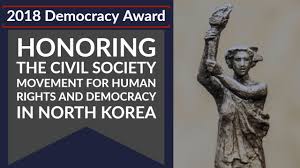 Combatting autocratic powers like Russia and China may require the kind of “transformation in the exercise of American leadership” that emerged when Republicans and Democrats joined forces in a bipartisan initiative to establish the National Endowment for Democracy (NED), Sen. Dan Sullivan and former Senate majority leader Tom Daschle suggest.
Combatting autocratic powers like Russia and China may require the kind of “transformation in the exercise of American leadership” that emerged when Republicans and Democrats joined forces in a bipartisan initiative to establish the National Endowment for Democracy (NED), Sen. Dan Sullivan and former Senate majority leader Tom Daschle suggest.
Investing in free media, healthy multiparty systems, civil society activists, an independent judiciary, inclusive political participation and electoral integrity can help those systems in other countries to withstand authoritarian subversion and fulfill their democratic potential. The impact of such support can be game-changing: A recent study suggests that international democracy support was one of the key factors in enabling democracies to “bounce back” after a period of autocratization, they write for The Hill.
The North Korean regime focuses all available resources on its top strategic objective: its own survival, according to a new report published by the George W. Bush Presidential Center. While all political regimes strive to survive, North Korea’s case is exceptional because of the extreme human rights violations it perpetrates in attempting to dominate all aspects of the lives of its citizens.
The report, by co-authors Victor Cha – a board member of the National Endowment for Democracy (NED) – and Katrin Fraser Katz, examines China and Russia’s roles in perpetuating North Korea’s human rights abuses and explores how recent global developments including the Covid-19 pandemic and the war in Ukraine have presented North Korea with new incentives and opportunities for repression.
The February 2014 U.N. Report of the Commission of Inquiry on Human Rights in the Democratic People’s Republic of Korea (DPRK) specifically details the North Korean regime’s gross human rights violations against its own citizens. However, the roles played by authoritarian leaders in Beijing and Moscow in facilitating North Korea’s human rights violations are less frequently examined. RTWT








